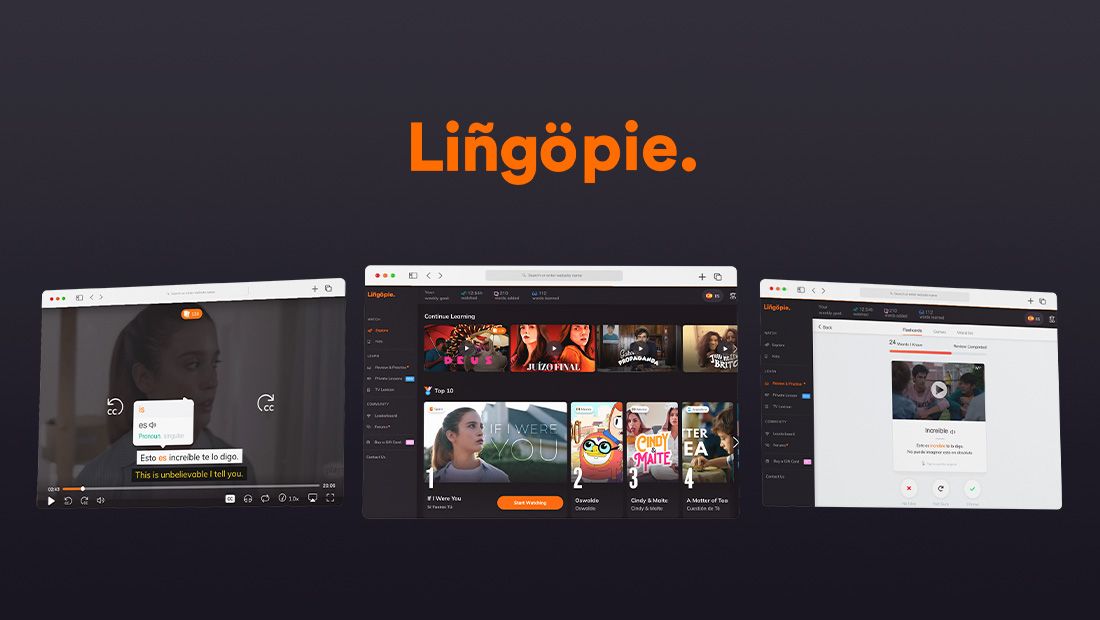If you’ve decided that 2022 is going to be the year that you finally get round to learning that new language you’ve always wanted to, then you may be trying to decide whether learn Spanish or learn Portuguese is the best choice.
Perhaps you’re planning on vacationing, traveling, or you want to learn a language to help progress your career.
You may wish to learn for the simple joy and satisfaction of becoming bilingual; whatever your reasons, we take a look below at the differences between the two languages and how to settle on the one that’s right for you.
Main Differences Between Spanish And Portuguese
So, for many people, Spanish and Portuguese are languages that sound similar to the ear. But is this the case?
Partly, yes, for sure - both Spanish and Portuguese are Romance languages and so share some inherent traits.
The other major Romance languages are French, Italian, and Romanian: these five tongues are all the ancestors of the Vulgar Latin that was brought to different regions of Europe by the invading battalions of ancient Rome.
Over time, these languages developed their own unique structure and characteristics, becoming distinct tongues in their own right.
However, although the two languages share a single heritage, they have their own unique personality and grammatical rules.
What are the differences between Spanish and Portuguese?
- The Portuguese language has been more influenced by French, whereas the influences of Ancient Arabic can be discerned in Spanish.
- Different use of vowels
- In terms of pronunciation, many Portuguese words reflect the French accent and intonation, while Spanish words often incorporate an Italian style of pronunciation.
- The expression of ‘you.’
- There are lots of false cognates - these are words that look the same in both languages, but have totally different meanings.

Similarities Between Spanish and Portuguese
So in what ways, specifically, are Spanish and Portuguese similar? Well, they share the same language, so there’s no need, with either, to learn any new letters.
Plus, the word ordering in both languages is largely the same, and there are some strong similarities in terms of vocabulary, too. The way that both languages use gender for common nouns is a shared trait, too.
Don’t Forget The Dialects!
Dialects can be confusing, especially for new learners: dialects are regional variations to a language and need to be taken into account when you’re trying to get to grips with a new tongue.
Immersive learning techniques are particularly useful for helping to make identifying and learning dialects easier, as it promotes natural and frequent exposure to the words and phrases unique to certain regions of Spain or Portugal or the dialects of other countries in which these languages are spoken.
Castilian Spanish is the most widely spoken dialect; it’s the main language spoken on the Iberian Peninsula. It has some distinct differences to Latin Spanish, both in how it sounds to the ear and in the meaning of a number of phrases and expressions.
Andalusian is commonly spoken in Southern Spain - one of the main differences that you’ll notice is that speakers of this dialect often drop the ‘s’ from the end of words.
There are many other Spanish dialects that are spoken either in different parts of Spain itself or in other countries where Spanish is spoken, such as Mexico and the Caribbean.
Portugal has plenty of diverse dialects, too!
There are four main dialects in Portugal: those found in the north and south of the country, as well as Azorean and Madeiranese.
There are a further sixteen distinct regional Portuguese dialects in Brazil, including Caipira, North Coast, and Baiano.

Is Spanish Or Portuguese Easier To Learn?
In terms of Spanish vs. Portuguese, you may be considering basing your choice on which language is considered to be the easiest to learn.
Ultimately, however, deciding which of the two is harder to gain proficiency in is a subjective matter - both languages are different enough from English to be a challenge to master, albeit a satisfying one.
And if you’re wondering, ‘is Spanish or Portuguese faster to learn?’ then the answer is the same: it’s subjective.
Each learner will no doubt uniquely approach their language journey, and the time that individuals have to commit to studying is just one of many factors that will affect the speed with which a language can be picked up.
Immersive methods of learning are now widely believed to be the best ways to gain proficiency in a new language fast - we discuss immersive learning techniques and their benefits further below.
Many people find that once they learn one of the Romance languages, picking up another is much easier than the first time around, so whichever you choose can be a springboard to the other if you find yourself bitten with the language learning bug!
Is Spanish or Portuguese More Useful To Learn?
A key concern for you may be whether Spanish or Portuguese will be most useful, especially if you want to learn a new language with your eye on progressing your career or securing a new role.
According to The Education Magazine, the top ten languages to learn to further your career are:
- German
- Spanish
- Portuguese
- Japanese
- French
- Arabic
- Mandarin Chinese
- Italian
- Russian
- Korean
So, when it comes to Portuguese vs. Spanish in the business stakes, both languages rank in the top three of the most useful to learn as career enhancers.
Spanish has over 483 million speakers, making it the second most spoken language in the world; with the growth of Spanish-speaking businesses in South America, this tongue could be a very good thing to have on your CV.
If these stats have made up your mind, then learn Spanish with Lingopie to gain proficiency by watching your favorite subtitled TV shows and movies!
Portuguese, however, is now thought to be the fastest-growing second language in Europe, and it is currently spoken by almost 260 million people worldwide; it’s the official language of Brazil, too, which is rapidly growing in terms of business and industry.
So if you decide to learn Portuguese, then you’ll be joining an ever-growing number of people who’ve decided that this will give them the professional edge.

For many prospective employers, the presence of a second language on a CV will often give a candidate the edge over the competition.
As well as offering an additional asset to the team, the fact that a candidate has been able to learn an additional language is evidence of commitment, hard work, and mental dexterity - things that any employer will appreciate.
But there are other reasons to learn a new language, of course! If you’re planning on traveling, then learning either Spanish or Portuguese will allow you to communicate in a multitude of countries to make the most of your travels. Here are
Being able to speak the local language can enrich your holiday or travel experiences.
As well as allowing you to immerse yourself more fully and authentically in the new culture, you’ll also be able to chat with the locals and navigate day to day life much more easily.
For example, reading a menu, locating the right train to board, or reading accommodation details are all possible with even a basic grasp of the language.
Plus, you’ll be more likely to find the little off-the-beaten-path gems that aren’t on the well-trodden tourist trails, and to make new friends, too!
What Are The Benefits Of Learning Another Language?
There are more advantages to learning another language than you may think!
As well as the benefits that having a second language on your resume can offer your career, and the obvious advantages of being able to speak the local tongue while traveling in the country, there are some other interesting plus points that will come with your learning.
Firstly, whether you’re traveling or not, bilingualism means that you’ll have an inherently deeper understanding and appreciation of other cultures.
You’ll be able to spot and understand subtle cultural nuances and fully enjoy the music, literature, and films of another country.
Learning a new language can also boost brain power, too!
The mental dexterity required to learn and then shift between two or more languages often results in better overall cognitive capacity: memory, concentration, decision-making, and creative thinking can all be enhanced.
Studies, too, have repeatedly shown that bilingualism can be effective protection against age-related Alzheimer’s disease.
This is thought to be due to the new connections in the brain that are formed when a new language is learned: these synapses help to provide alternative cognitive ‘routes’ in the brain, which serves to slow down the progress of Alzheimer’s in many cases.

Interestingly, learning a new language has been consistently found to improve your use of your native language due to your brain’s increased proficiency at understanding the subtleties and nuances and the inherent mechanisms of the spoken word.
Children that have grown up in bilingual households, and speak more than one language, tend to do better in all areas of the curriculum.
Lastly, as mentioned above, most people find that, once they learn a second language, picking up a further one after this is a relatively easy undertaking: so you may end up being not only bilingual but multilingual!
What Is The Best Way To Learn Either Spanish Or Portuguese?
Whether you choose to learn Spanish or Portuguese, most of the same considerations will apply when it comes to studying.
Before signing up for a course, think carefully about your other commitments and the time you realistically have available to commit to a class. This is really important to avoid committing to a course of study that you subsequently find you can’t complete due to time restraints.
You may decide that an in-person class is best for your needs or find that an online course fits in better around your work and kids. Consider which style of learning will suit you best: some people find that in-person sessions are best to keep them motivated, while others find a more flexible way of learning to be preferable.
There may also be travel considerations that will need to come into play and, if some sessions run on the weekend, you’ll need to think, too, about your ability to attend consistently.
Get prepared for your study as the time approaches to start your course.
You could undertake a bit of batch cooking to stock up your freezer with nutritious meals that you can grab out for convenience and think about how your family rota may need to flex to accommodate the extra demands on your time and energy.
Extended Study Sessions or Short Bursts?
For some people, being able to get their head down to study for a solid hour or two a day is the most productive way of learning. However, this may not be a possibility, practically, for many.
Studies have found that information is better retained when learning is done in several short bursts throughout the day, so don’t be put off if your circumstances mean that you’ll need to work in this manner.
It may well turn out to be to your advantage! Studying, little and often, throughout the whole day can also help you maintain motivation and prevent tiredness from creeping in and potentially sabotaging your learning.
Immersive Learning Techniques
Increasingly, immersive learning techniques are being viewed as the very best and most effective way to learn a new language.
This method involves surrounding yourself with the target language as much as possible, daily. You could do this by, for example, listening to Spanish or Portuguese music, and changing the settings on your phone to the new language, too.
There are plenty of other options you can employ when it comes to immersive learning: why not listen to music in Spanish, or flip through a daily newspaper in Portuguese?
Many people find it useful to relabel items in their kitchen cupboard or office in the new language so that they see this vocab every day.
Watching specially subtitled TV programs and movies is another great immersive learning technique and can help you to stay motivated while learning - it’s hard to remember you’re learning at all when you’re enjoying relaxing on the sofa and watching a binge-worthy box set!

Connecting with a study buddy can also help you to incorporate the new language into your life regularly. You could arrange to have a weekly phone call or meet for coffee on the weekend and agree that you’ll only converse in Spanish or Portuguese for the duration.
Why not exchange emails in the target language, too, to help you get used to writing in the language as well as speaking and listening to it.
Finally, you could join an online forum designed to allow you to connect with other learners to practice your Spanish conversation skills, or your Portuguese chat or find a local meet of other learners to talk in the new language in person. This can be a great way of building a support network to help keep morale high in your language learning journey.
Learn Spanish Or Portuguese By Watching TV!
This may sound too good to be true, but it is possible to learn either Spanish or Portuguese by watching subtitled TV and movies!
As an immersive technique, this is one of the best there is: shows help to build vocabulary and conversational skills and can help learners get to grips with the accent and pronunciation of the new language.
The often less-formal, everyday language that can be heard in TV programs and films can be much more helpful in terms of practical learning, while viewers will also have plenty of opportunities to encounter different regional variations of the tongue - not to mention some fun slang and colorful phrases!
Learn Spanish by watching tv shows, or pick up Portuguese while relaxing in front of a great film.
Staying motivated doesn’t tend to be a problem when your learning is being supported by a great movie or an addictive series; your main problem may be tearing yourself away from your ‘studies’!

Lingopie is a language learning platform that offers a huge range of specially subtitled tv shows and films, including in Spanish and Portuguese, and that are suitable for different levels of competencies, so your viewing choices can change as you gain in proficiency and confidence.
Learners can also access a range of interactive tools to help consolidate their learning and build on their skills. New titles are constantly being added to the platform, and there is a wide variety of genres, so you’re sure to find plenty to enjoy!
Whether you plump for Spanish or Portuguese, if you learn a language with Lingopie, you will have access to a vast library of titles so that you can easily fit your learning into your daily routine.
Don’t be surprised if family members or friends want in on the act, too - luckily, there are lots of titles suitable for the kids to watch, too!
So, all that’s left to do now is to grab a big bowl of popcorn, snuggle up on the sofa, and choose your first subtitled movie to indulge in.






![5 Official Spanish Language Tests To Show Your Proficiency Level [Guide]](/blog/content/images/size/w300/2025/06/Spanish-Language-Tests.jpg)

![Why Memorizing Spanish Words Won’t Make You Fluent [Tips]](/blog/content/images/size/w300/2025/06/how-to-practice-spanish-vocabulary.jpg)
![14 Spanish Filler Words To Sound Like A Native [Guide]](/blog/content/images/size/w300/2025/06/Spanish-Filler-Words.jpg)